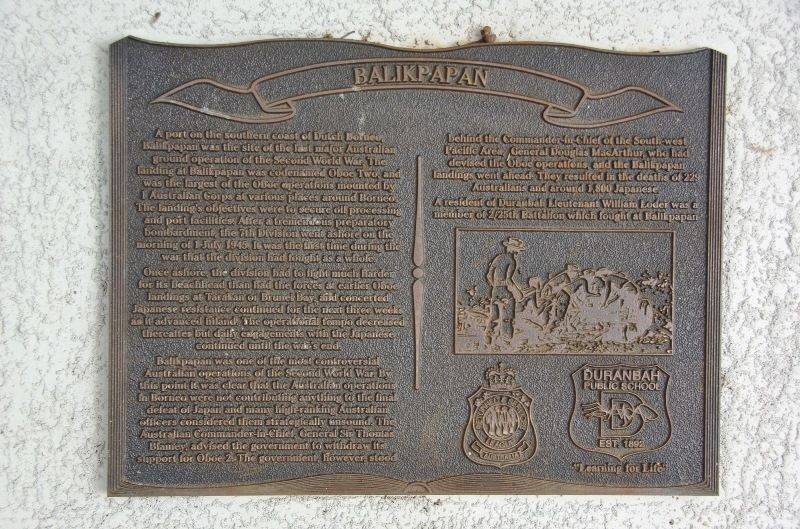
Home » Themes » Conflict » World War Two
Balikpapan MemorialPrint Page 

Location
| Address: | 11 Murphys Road, Wommin Bay Memorial Walk, Kingscliff, 2487 |
|---|---|
| State: | NSW |
| Area: | AUS |
| GPS Coordinates: | Lat: -28.234409 Long: 153.565574 Note: GPS Coordinates are approximate. |
Details
| Monument Type: | Plaque |
|---|---|
| Monument Theme: | Conflict |
| Sub-Theme: | WW2 |
| Actual Event Start Date: | 01-July-1945 |
| Actual Event End Date: | 21-July-1945 |
| Link: | http://www.dva.gov.au/consultation-… |
Dedication
| Approx. Monument Dedication Date: | 2015 |
|---|
Balikpapan
Balikpapan was the site of the last major Australian ground operation of the Second World War. The landing at Balikpapan was codenamed Oboe Two, and was the largest of the Oboe operations mounted by 1 Australian Corps at various places around Borneo. The landing's objectives were to secure oil processing and port facilities. After a tremendous preparatory bombardment, the 7th Division went ashore on the morning of 1 July 1945. It was the first time during the war that the division had fought as a whole. Once ashore, the division had to fight much harder for its beachhead than had the forces at earlier Oboe landings at Tarakan or Brunei Bay, and concerted Japanese resistance continued for the next three weeks as it advanced inland. The operational tempo decreased thereafter but daily engagements with the Japanese continued until the war's end.
Balikpapan was one of the most controversial Australian operations of the Second World War. By this point it was clear that the Australian operations in Borneo were not contributing anything to the final defeat of Japan and many high-ranking Australian officers considered them strategically unsound. The Australian Commander-in-Chief, General Sir Thomas Blamey, advised the government to withdraw its support for Oboe 2. The government, however, stood behind the Commander-in-Chief of the South-west Pacific Area, General Douglas MacArthur, who had devised the Oboe operations, and the Balikpapan landings went ahead. They resulted in the deaths of 229 Australians and around 1,800 Japanese.
A resident of Duranbah Lieutenant William Loder was a member of 2 / 25th Battalion which fought at Balikpapan
Returned & Services League Australia
Duranbah Public School Est. 1892
"Learning for Life"



